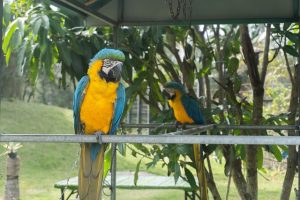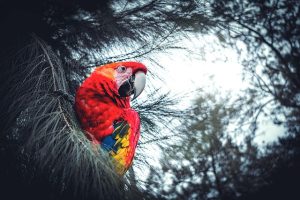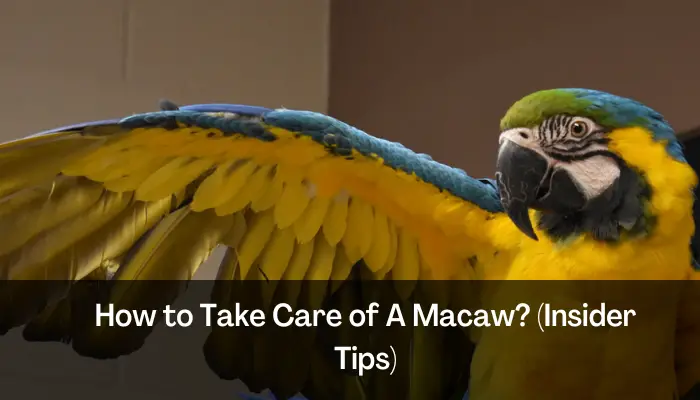Learning to read the actions and body language of a macaw parrot is an important component of providing proper care for one.
You also need to be aware of what foods to provide the macaw as well as how to ensure that it stays healthy. It is also just as crucial to make sure that its enjoyment, activity, and resting needs are met by properly setting up its cage.
This article will aim to answer all the questions related to taking proper care of a macaw.
Choosing the Correct Size and Properly Positioning a Cage
- Cage Requirements
The very first step to taking care of a macaw is choosing a suitable cage for it and correctly placing it for the bird’s convenience.
Macaws are large parrots that require room to fly around and perch on various objects. An adult macaw requires a cage that is 6 feet in height, 5 feet in width, and 4 feet in depth. Your parrot needs a cage that is at least twice as large as its wingspan.
A cage liner is essential for collecting your parrot’s waste and droppings. You can also use an entire newspaper sheet, which is easy to remove and discard.
Your macaw will be happier and healthier if you provide it with a variety of perches to pick from in its cage, so be sure to include at least three perches of varying heights and orientations. Most parrots feel more secure when perched high up.
Then you can add to the cage things like a swing, a rope ladder, a bell, and a dish for food and water.
- Positioning the Cage
Put the crate somewhere; you’ll see it often, but where there won’t be too much background noise. You should hold it in an area where you both spend a lot of time, such as your family room or your home office.
Avoid putting your bird’s cage in high-traffic areas like the foyer, living room, or bedroom. Toxic chemicals included in non-stick cooking and cleaning products can be fatal to birds.
Don’t use candles of any kind, scented or not, in the room where your parrot resides.
Place the cage at shoulder height so that your macaw can see out at the world. Your parrot will feel safer with these two walls because there will be less of an area for it to keep an eye on.
Let your macaw have supervised exposure to normal sunlight. A shaded spot in the cage is ideal. Don’t ever leave your parrot in the sun all day long. They can get hot very easily.
What to Feed Your Macaw

About 10% of a parrot’s body weight is consumed by parrots as food daily.
Approximately 65% of its food should be pellets. Your parrot’s health can be maintained using pellets because they include a wide variety of nutrients essential for them.
Fruits, grains, and vegetables, all fresh, should make up the remaining 25 percent.
Treats like seeds and unsalted nuts should make up the remaining 10%.
The following items should be included in a macaw’s diet to ensure a balanced diet:
- Vegetables
- Seeds
- Pellets
- Fruits
- Grains
Macaws as pets require a diet of fresh food and regular water changes.
Macaws can go 2 to 3 days without food before their health rapidly deteriorates. Bigger macaws have a four-day endurance before they begin to suffer from malnutrition.
To ensure your macaw always gets clean water, you should replace its bowl every day.
How often do Shower Macaws?
Shower your macaw 3-4 times a week. Keep in mind, however, that overdoing it can cause the macaw to get Dry Skin. Macaws like to be clean and will wash if given a bowl of water.
What should be the Length of the Macaw’s Nails
The size of a parrot’s claws should be proportionate to body mass. There is no set rule for the length of a claw, although they should be trimmed down to the ‘quick.’
This makes sure the parrot does not face difficulty moving or perching. The ‘quick’ is the central portion of a parrot’s nail, where nerves and blood vessels begin.
Never trim a parrot’s nails right to the edge, as doing so risks severing the blood supply. If you have difficulty managing your parrot, let the vet handle the nail trimming.
Let your Macaw Exercise
Allow your macaw to spend a minimum of 30 minutes outside its cage once every day. You must let your macaw fly around so it can flex its wings and use its muscles.
While outside the cage, you can entice parrots to play “tug-of-war” or “fetch” with you. You may build a strong relationship with your parrot by playing with it frequently.
The lipid metabolism and cholesterol levels of parrots were improved by 40 minutes of daily monitored time outside the cage for 105 days.
Taking Care During Winter

Aside from keeping your house moderately warm and humid, the best thing you can do to help your bird throughout the dry, cold winter is to encourage it to eat a diverse range of plant-based foods. Vitamin A and Omega fatty acids are two nutrients that help your bird’s exterior and internal skin health.
Red Palm Oil is also a nutritional powerhouse for parrots. Vitamin A, beta carotene, and important fatty acids, especially Omega-3s, are plentiful in red palm oil. Vitamin A plays a crucial role in maintaining healthy, supple skin.
Aside from keeping your house moderately warm and damp, the best thing you can do to help your bird throughout the dry, frigid winter months is to encourage it to eat a diverse range of plant-based foods. Vitamin A and Omega fatty acids are two nutrients that help your bird’s exterior and internal skin health.
Red Palm Oil is also a nutritional powerhouse for parrots. Red palm oil is high in vitamin A, beta carotene, and important fatty acids, specifically Omega-3. Vitamin A is directly responsible for healthy skin.
The outer skin as well as the delicate skin tissue that lines the nasal cavity, respiratory system, reproductive system, and digestive system. These are vital systems in your bird’s body, and when they aren’t adequately lubricated, your bird is not just incredibly uncomfortable but also vulnerable to lethal diseases.
Taking Care During Summer
Birds can get easily overheated during the hot summer. Installing water misters is a solution for keeping an outdoor aviary cool when temperatures become too high. Your bird will feel a little better thanks to the cooling evaporation.
To keep cool, a heated bird will pant, stay low on its perch, and spread its wings.
Make sure your pet has access to water and isn’t confined when you have to leave it indoors on extremely hot days. A huge dish of water can also be placed in their environment. Also, draw the blinds to block the sun and seal any cracks that allow cool air to escape.
Do not expose your parrot to drafts, but a ceiling fan or oscillating fan will create a slight wind that enhances cooling evaporation.
Conclusion
Taking care of a macaw is not as complex as some people might think. It’s a similar formula to taking care of all the other animals. They are delicate birds and maintaining their nutrition, warmth, exercise, and hygiene should do it for the most part.

Hi, I’m Regina Rios. Just another bird lover who loves to share knowledge from personal experience. I’ve grown up with pet birds since childhood as my mommy also loves birds. As I can’t pet many birds in open air in my house as my mom does; I created my first bird cage on my rooftop using wood, copper wire, and a metal shed in 2018 and start collecting pet birds. Now, I have so many pet birds such as Macaws, Parrot, Cockatiel, Parakeet, and others. Not only that, if I see natural birds are injured I keep them in my house until they get well. Now, my hobby becomes my income source as my home birds have babies and I sell them to birds lover like mine. I’ve created this blog to inspire others bird owners by sharing my personal knowledge. Good Luck!


